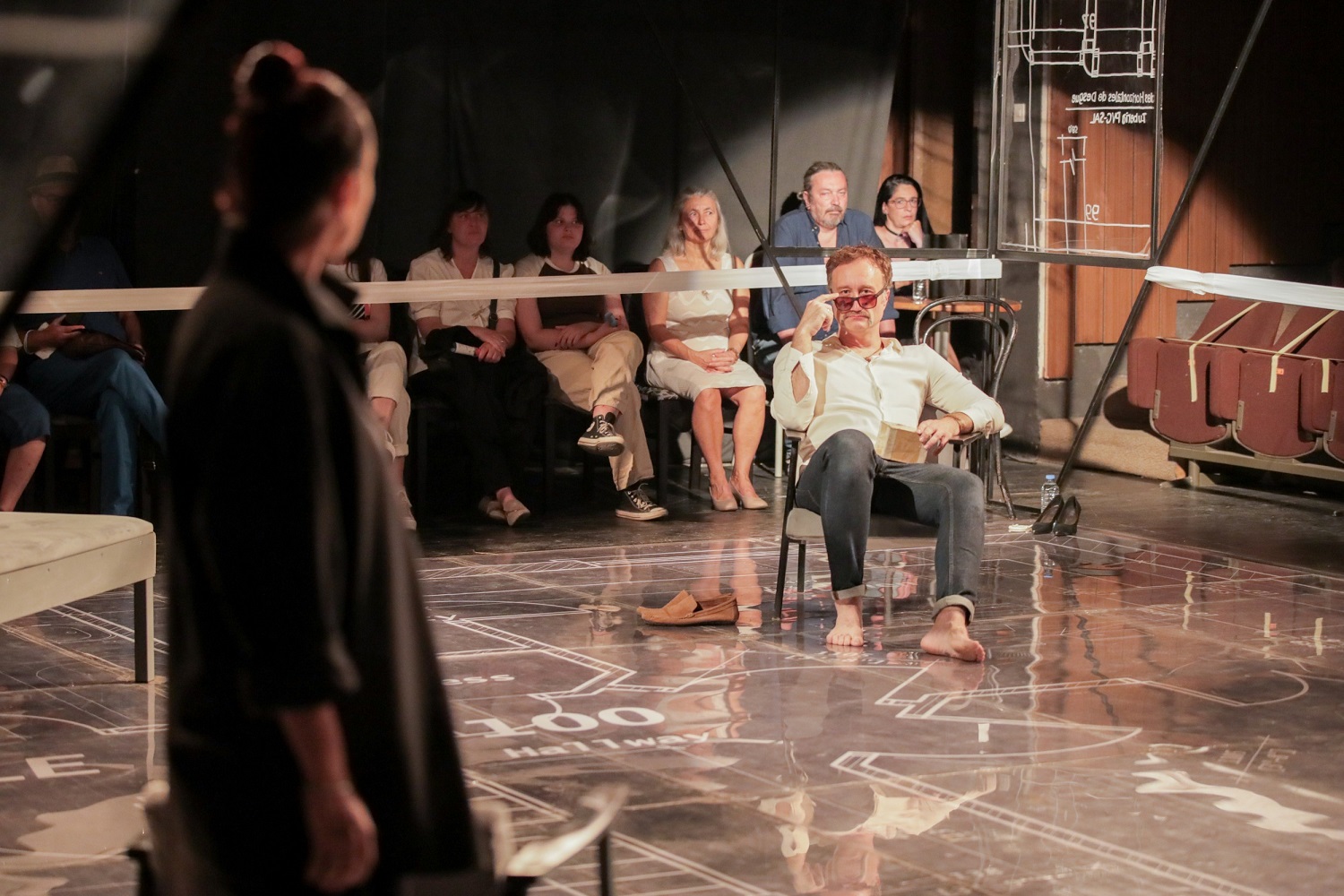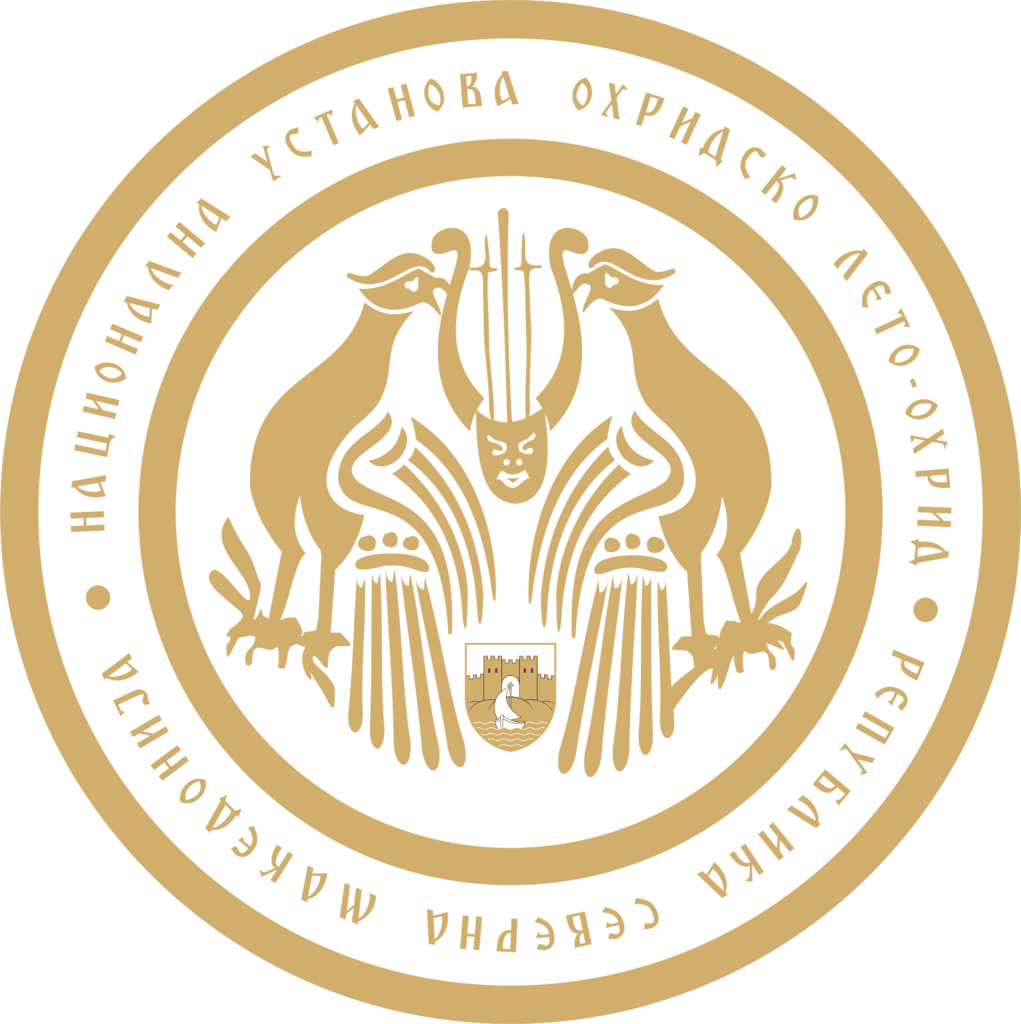
Imagine four characters, divided in two married couples, who at the beginning of the play are reserved in a Scandinavian manner, while at the end, after almost two hours intensive drama, are literally scattered from the most fervent emotional stripping and sizzling. Catarina (Ilina Chorevska) and Frank (Ognen Drangovski) are one couple, and Yena (Marija Stefanovska) and Thomas (Zdravko Stojmirov) are the second one in the intimate contemporary anti-fairy tale by the Swedish author Lars Noren, directed by Vasil Hristov.
In “Demons” two married couples living in the same block of flats, in apartments one above the other, barely know each other greeting when they see each other in the corridors. At one moment, by accident or not, they have the opportunity to meet closely. At first glance, they are completely different, Catarina and Frank look like partners in an open relationship, whereas Jena and Thomas like conservative spouses – parents of two. At the beginning we witness the emotional amplitudes in the relations between Catarina and Frank: their mutual accusations and counter-accusations for treachery slowly reveal their relations with their ex-partners and parents. Anyway, the “voyeur” from outside couldn’t put a remark for a lack of passion in their relationship.
The second couple lives a seemingly boring family life, with childcare and daily working obligations. The moment Jena becomes an object of passion of the sexual predator Frank marks the entrance in the emotional wombs of the characters. The usual marriage/partner reprimands for adultery or coldness get doubled, and then multiplied: adultery is a veil for sexual impotence, and that impotence for the latent homosexuality. Jealousy is an unconditional passion, and that passion even reaches a murder out of love. There is more to that repertoire, because the list of the inner human demons seems endless…
The setting of “Demons” in the Bitola National Theatre, written in 1982, is its first performance on the Macedonian theatre scene (February 2022) of this play by the “new August Strinberg”, as the world theatre criticism calls the recently deceased Noren (Stockholm 1944 – 2021). Lars Noren, the most performed Swedish playwright in his homeland and abroad, was in constant search for in his dark plays, full of brutal scenes inspired by family relations, usually related to the influence of the parents. Criticism in his plays recognizes the reality in the Swedish society “filtered” through the structure of the post-modernism commedia dell’arte (commedia dell’arte – a theatre form conceived in Italy in mid-15th century, dominant up to 18th century, with huge impact on the comedy theatre whose most prominent representative is Molière).
The translation from English to Macedonia of “Demons” is by Snezhana Plushkovska, the scenography by Valentin Svetozarev, and the costume design by Andrej Gjorgievski. The performance of “Demons” at Ohrid Summer Festival was at the Centre of Culture “Grogor Prlichev”. The audience is on the very stage, designed as an ultra-minimalistic allusion of two homes, formatted as a rink, whereas the characters/actors are situated just like the boxers at the corners, each of them in a separate corner. The scene – just as the boxing rinks – is surrounded from all sides by the audience, who are just a meter away from the actors, and can literally touch them, feel their breath and tiniest tremble, see the drops – later pours – of sweat, so their “voyeur” position corresponds with the phenomenon of the popular reality shows. After the already three-year-long pandemics with Covid -19, this concept is close to some “touch therapy” for general resocialization.
“Demons” impresses with its fierce rhythm directed by Hristov and the play of the actors. Chorevska, Drangovski, Stefanovska and Stojmirov are like acting “boxers” taking out every atom of their roles, and, physically, of their bodies. That rhythm on stage is an impression of its kind in the previous plays directed by Vasil Hristov on the Macedonian theatre scenes. “Marrat Sade” by Peter Weiss and “Tempered Opera” in his dramatization, then the play sets of recent times by the independent “Wonderland” theatre – Skopje, whose cofounder is Hristov (“Death and the Maiden” by Ariel Dorfman and “Class Enemy” by Nigel Williams) are only part of his recognizable opus created in the past three decades.
The way the dialogues in “Demons” are both cruel and raw, with harsh humour on the verge of correctness, such they “colour” the crazy rhythm of the play. Besides looking as a distant comparison, the music curtain mainly made of Italian chansons, canzones and opera arias draw the drama thread of Noren with the above mentioned commedia dell’arte.
The “muscles” of this whole fantastic construction are the actors from the Bitola Theatre, who seem to posess immense spectrum of expressive manners. Few Macedonian theatre institutions mark such successful transitions of actors’ generations, and the results this theatre achieves: each new generation has, let’s say, superior creative criteria and achievements. While watching Chorevska, Drangovski, Stefanovska and Stojmirov in “Demons”, you witness a diamond refurbishing in a form of actors, who get “burned” on stage over and over again, but never melt in their acting.
That is the reason the applause of the audience for “Demons” at Ohrid Summer Festival lasted for several minutes: that was the smallest “effort” the spectators could put in this emotional adventure with the actors and creators of “Demons” by the Bitola national Theatre.
Stojan Sinadinov

